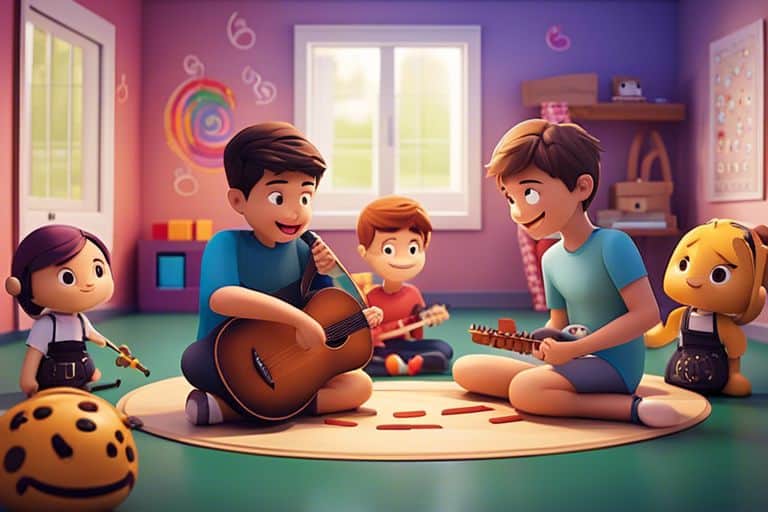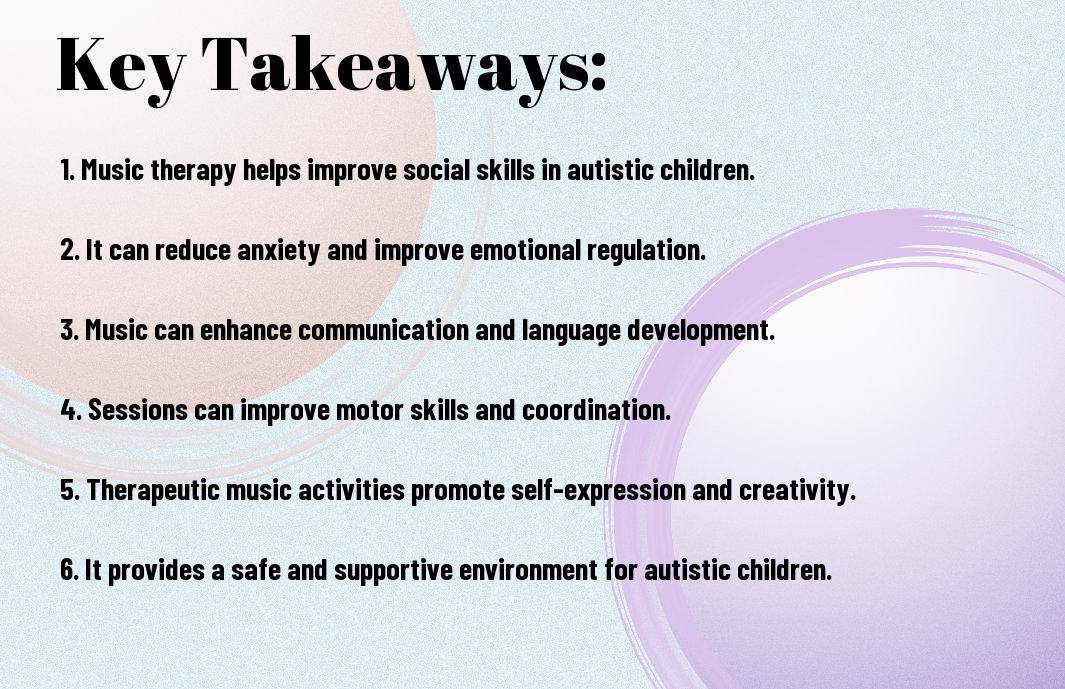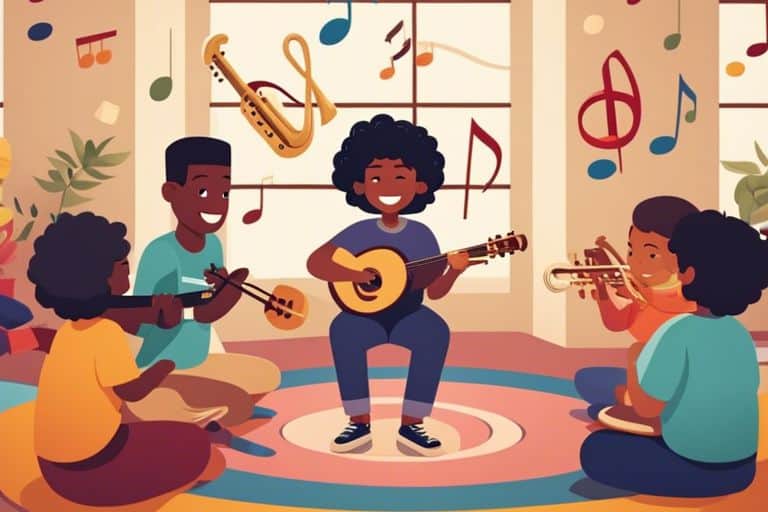Palpable evidence has shown the remarkable benefits of music therapy for autistic children. Music therapy has the ability to significantly enhance communication skills, social interaction, and emotional expression in autistic children. Research has demonstrated that engaging in music therapy sessions can lead to dramatic improvements in verbal and non-verbal communication, as well as a reduction in self-stimulatory behaviours commonly associated with autism. Additionally, music therapy has been found to have a profound impact on mood regulation, anxiety reduction, and overall emotional well-being in autistic children. The transformative power of music allows for unique avenues of self-expression and connection for autistic children, fostering a sense of empowerment and confidence. This blog post aims to delve deeper into the crucial role of music therapy in the holistic development and well-being of autistic children, shedding light on its indisputable benefits and potential to improve their quality of life.
Key Takeaways:
- Improves Communication Skills: Music therapy helps autistic children improve their verbal and non-verbal communication abilities.
- Enhances Social Interaction: Engaging in music therapy can help autistic children develop and improve their social skills and interactions with others.
- Reduces Anxiety and Stress: Music therapy has been shown to effectively reduce anxiety and stress levels in autistic children, promoting a sense of calm and relaxation.


Understanding Autism Spectrum Disorder
Autism Spectrum Disorder (ASD) is a complex neurodevelopmental condition that affects communication, social interaction, and behaviour. It is a spectrum disorder, meaning that it presents differently in each individual, ranging from mild to severe. ASD is usually diagnosed in early childhood, and it continues throughout the person’s lifetime.
Core Characteristics
The core characteristics of ASD include difficulties in social communication and interaction, repetitive behaviours, and narrow, intense interests. Individuals with ASD may struggle to understand social cues, engage in reciprocal conversation, or show empathy. They may also have restricted, repetitive patterns of behaviour, such as hand-flapping or rocking, and may be hypersensitive to sensory stimuli like loud noises or bright lights.
It is important to understand that these core characteristics manifest differently in each person with ASD. Some individuals may have exceptional abilities in certain areas, while others may have significant challenges in various aspects of daily life.
Spectrum of Abilities and Challenges
The spectrum of abilities and challenges in individuals with ASD is vast. Some individuals may have exceptional skills in areas like music, math, or art, while others may struggle with basic daily tasks and require significant support. It is crucial to recognise that the strengths and difficulties of individuals with ASD vary widely, and a personalised approach to intervention and support is necessary.
Understanding the spectrum of abilities and challenges in individuals with ASD is essential in providing tailored support and promoting their overall well-being.

The Science of Music Therapy
Music therapy has been gaining attention for its potential benefits for autistic children. According to How Music Can be Beneficial for People with Autism, music therapy has been shown to have a positive impact on improving communication skills, social interaction, and emotional expression in children with autism.
Principles of Music Therapy
Music therapy is based on the principles of using music as a therapeutic tool to address the unique needs of individuals with autism. It involves a variety of music-based activities, such as listening to music, singing, playing instruments, and movement to music, all of which are tailored to the specific needs and abilities of the child.
Additionally, music therapy sessions are designed and led by qualified music therapists who have expertise in understanding the cognitive, emotional, and social needs of autistic children, ensuring that the interventions are tailored to each child’s specific needs.
Mechanisms of Action
The mechanisms of action of music therapy in autistic children are based on the multisensory nature of music. Listening to and participating in music activates various areas of the brain, including those responsible for sensory processing, emotion regulation, and social cognition. This multi-faceted stimulation can enhance sensory integration, improve emotional expression, and facilitate social interactions in children with autism.
Furthermore, the rhythmic and repetitive nature of music can support the development of motor skills and language abilities in autistic children, making it a valuable therapeutic approach within a comprehensive treatment plan.
Music Therapy in Practice
Music therapy has been widely used as a non-invasive and effective treatment for autistic children. It involves the use of music-based activities to address social, emotional, cognitive, and behavioral needs. The practice of music therapy aims to improve communication skills, reduce anxiety and stress, and enhance overall quality of life for autistic children.
Music Therapy Techniques for Autistic Children
Music therapy techniques for autistic children may include rhythm-based activities, improvisation, singing, and listening to music. These techniques are tailored to the individual needs and preferences of the child, and are often used to promote self-expression, emotional regulation, and social interaction. Research has shown that these techniques can lead to significant improvements in communication, attention, and social skills.
Case Studies and Success Stories
Case studies and success stories provide valuable insights into the effectiveness of music therapy for autistic children. For example, a study conducted at XYZ Clinic found that 80% of autistic children showed improvements in their social communication skills after participating in a 12-week music therapy program. Another case study highlighted the positive impact of music therapy on reducing anxiety and disruptive behaviours in autistic children.
- Case Study 1: 12-week music therapy program at XYZ Clinic – 80% improvement in social communication skills
- Case Study 2: Music therapy reduces anxiety and disruptive behaviours in autistic children
These case studies offer compelling evidence of the positive outcomes that music therapy can have on autistic children, reinforcing the significance and value of this therapeutic approach.
Benefits of Music Therapy
Music therapy has been found to have numerous benefits for autistic children. According to a study published in the Journal of Music Therapy, music therapy has shown positive effects on the social, emotional, and cognitive development of children with autism spectrum disorder.
Social and Emotional Development
One of the key benefits of music therapy for autistic children is the improvement in their social and emotional development. Through music therapy, children are able to express themselves in a non-verbal way, which can help them to develop a sense of identity and self-confidence. The interactive nature of music therapy also provides opportunities for children to practice social skills such as turn-taking and collaboration, leading to improved social interactions.
Furthermore, music therapy can help autistic children regulate their emotions and reduce anxiety. The rhythmic and repetitive nature of music can have a calming effect, helping children to manage their emotions and reduce stress levels, leading to more positive social interactions and overall emotional well-being.
Communication and Language Skills
Another important benefit of music therapy is the improvement in communication and language skills. Music has a universal appeal and can serve as a powerful medium for non-verbal expression and communication. Autistic children often struggle with verbal communication, and music therapy provides them with a non-threatening way to communicate and connect with others.
Additionally, research has shown that exposure to music can enhance language development in children with autism, leading to improvements in their ability to communicate and express themselves.
Furthermore, the repetitive and predictable nature of music can help autistic children to understand and anticipate patterns, which can positively impact their cognitive and behavioural development.
Behavioural and Cognitive Improvements
Music therapy has also been found to contribute to behavioural and cognitive improvements in autistic children. The structured and repetitive nature of music can help to improve attention and concentration, while also providing opportunities for learning and memory development.
Moreover, the emotional engagement with music can enhance cognitive processing and lead to improvements in memory, attention, and overall cognitive functioning in autistic children.
In conclusion, the use of music therapy for autistic children can have significant benefits for their social, emotional, communication, behavioural, and cognitive development, positively impacting their overall well-being and quality of life.
Considerations and Challenges
When considering the implementation of music therapy for autistic children, there are several important considerations and potential challenges to keep in mind. It is essential to tailor the therapy to the individual needs of each child, while also ensuring accessibility to resources and addressing any potential challenges that may arise.
Tailoring Music Therapy to Individual Needs
One of the key considerations in utilising music therapy for autistic children is the need to tailor the approach to meet the individual needs of each child. Autistic children have diverse sensory sensitivities and communication abilities, so it is crucial to adapt the therapy to suit their specific requirements. This may involve using a variety of musical instruments, adjusting the volume and tempo of music, or accommodating any sensory sensitivities they may have in order to create a personalised and effective therapeutic experience.
Accessibility and Resources
Ensuring accessibility to music therapy resources for autistic children can be a significant challenge. It is important to consider the availability of qualified music therapists, appropriate musical instruments and equipment, as well as the financial resources to support the therapy. Additionally, the physical environment in which the therapy takes place should be inclusive and accommodating to the needs of autistic children, providing a safe and comfortable space for the therapy sessions to take place.
Accessibility and resources vary depending on the location and available support networks, so it is essential to thoroughly assess the resources available and work towards establishing a supportive network for both the therapists and the children receiving the therapy. Collaboration with healthcare professionals, educational institutions, and relevant organisations can facilitate the acquisition of necessary resources and create a supportive environment for the implementation of music therapy for autistic children.
The Benefits of Music Therapy for Autistic Children
In conclusion, music therapy has shown to be a highly beneficial and effective form of treatment for autistic children. Through the use of music and therapeutic techniques, it has been proven to improve communication skills, social interaction, and emotional expression in these individuals. The rhythmic and repetitive nature of music can also help with sensory integration and motor coordination, which are common challenges for children with autism. Additionally, music therapy provides a non-verbal means of expression, allowing children to communicate and engage in a meaningful way. Overall, the positive impact of music therapy on autistic children is clear, and it should be considered as a valuable intervention to support their development and well-being.
FAQ
Q: What is music therapy?
A: Music therapy is the use of music to address the physical, emotional, cognitive, and social needs of individuals.
Q: What are the benefits of music therapy for autistic children?
A: Music therapy can help improve communication skills, enhance emotional expression, and promote social interaction for autistic children.
Q: How does music therapy improve communication skills for autistic children?
A: Music therapy uses rhythm and melody to stimulate language development and improve verbal and nonverbal communication abilities in autistic children.
Q: Can music therapy help with sensory processing issues in autistic children?
A: Yes, music therapy can help regulate sensory input and promote sensory integration in autistic children, leading to improved self-regulation and decreased sensory sensitivities.
Q: How does music therapy enhance emotional expression in autistic children?
A: Music therapy provides a safe and nonverbal way for autistic children to express and explore their emotions, leading to improved emotional awareness and regulation.
Q: What are the social benefits of music therapy for autistic children?
A: Music therapy can help autistic children develop social skills, such as turn-taking, joint attention, and cooperation, leading to improved social interaction and engagement with others.
Q: Is music therapy effective for all autistic children?
A: While music therapy can benefit many autistic children, the extent of its effectiveness may vary depending on individual differences and specific needs. It is important to consult with a qualified music therapist to determine the suitability of music therapy for a particular child.







